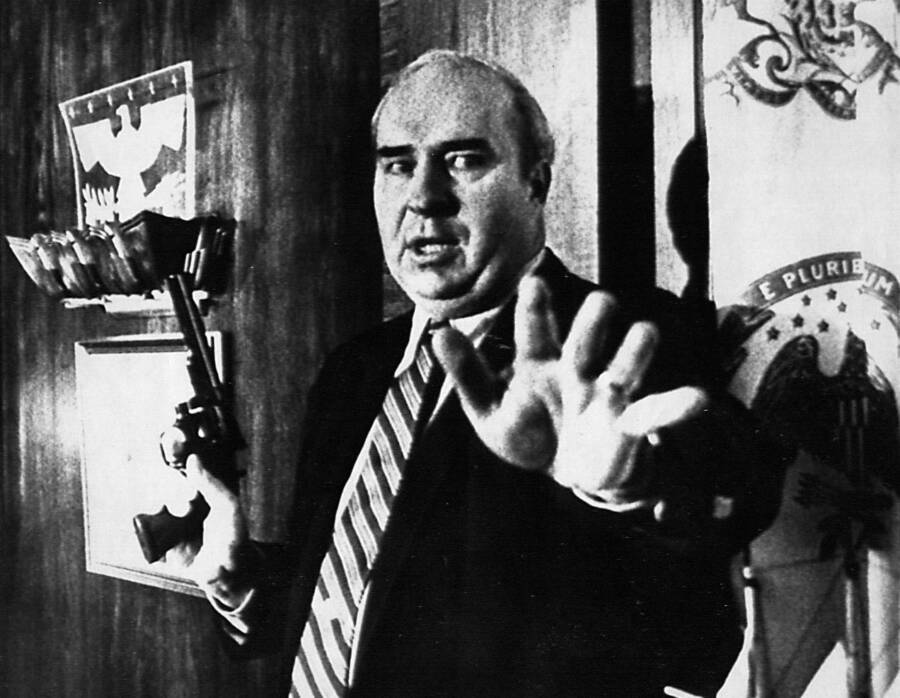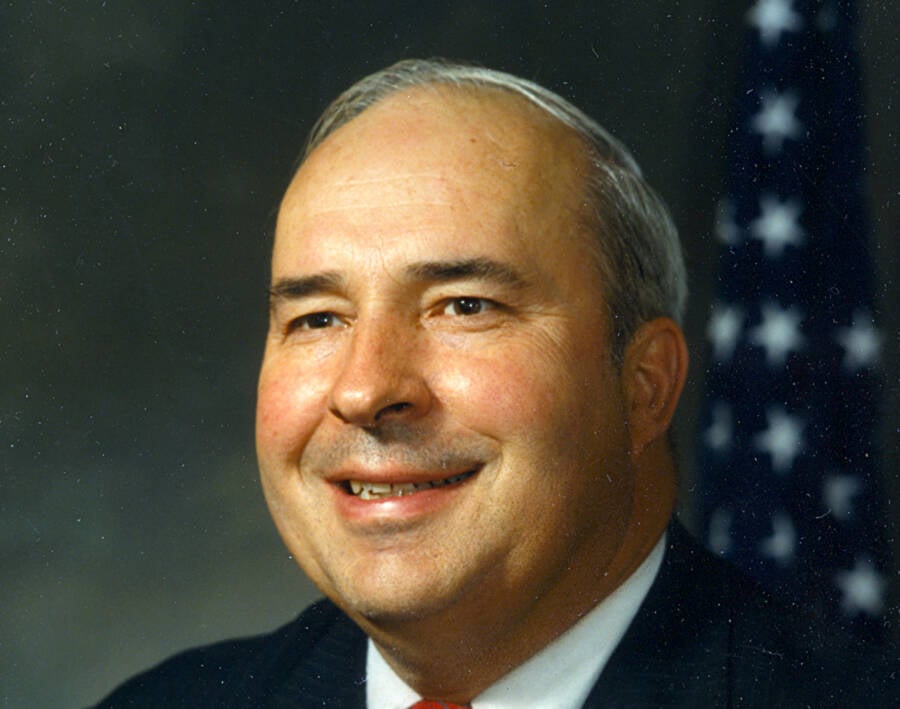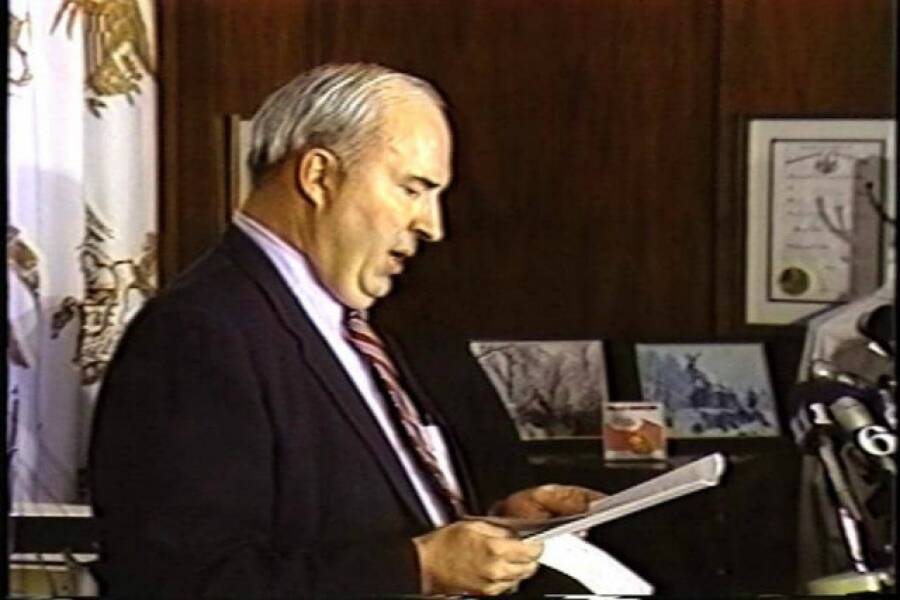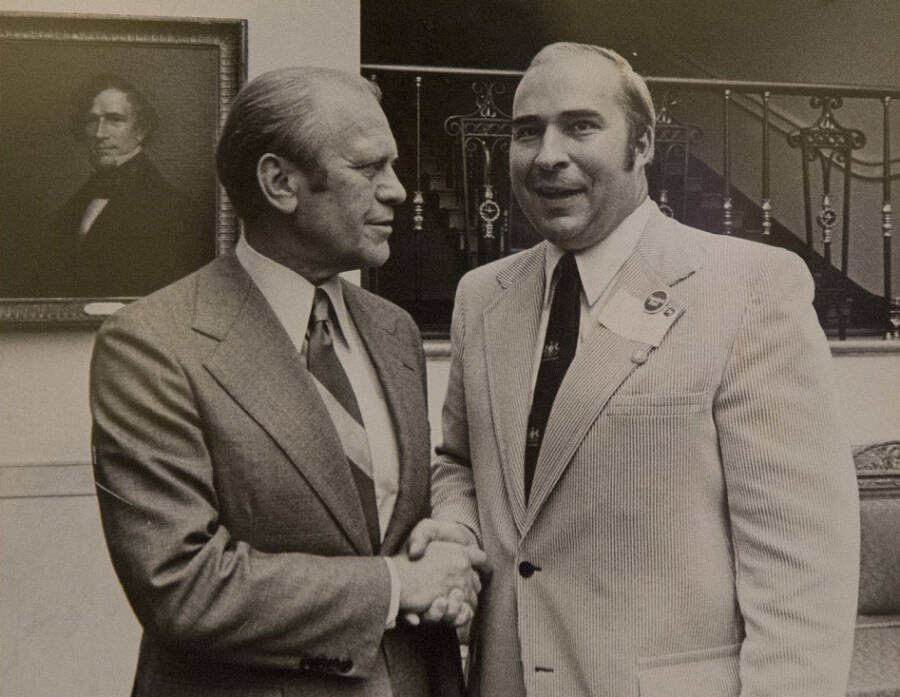In 1986, Pennsylvania state treasurer Robert Budd Dwyer was convicted of bribery charges — then he shot himself in front of television cameras a few months later.

Wikimedia CommonsR. Budd Dwyer warning others to stay back just seconds before fatally shooting himself in front of television cameras on January 22, 1987.
In January 1987, R. Budd Dwyer’s suicide left America in shock — not because R. Budd Dwyer was particularly well known outside of Pennsylvania, but because his violent death took place in the most public place imaginable: a press conference. And it was all on camera.
On January 15, 1987, R. Budd Dwyer, the acting Pennsylvania State Treasurer, held a meeting in his suburban Pennsylvania home. He sat with his press secretary James Horshock and Deputy Treasurer Don Johnson to discuss setting up a press conference related to his recent legal issues.
The 47-year-old was a week away from his sentencing on convictions connected to bribery, but he remained adamant about his innocence, as he had done throughout the investigation and trial.
Both Horshock and Johnson left Dwyer’s home that evening assuming that their boss would resign at the press conference on January 22 after making one last statement of innocence and pleading for mercy in front of the local media.
Dwyer had other plans:
Who Was R. Budd Dwyer?
Robert Budd Dwyer graduated from Allegheny College in Meadville, Pennsylvania, and quickly became active in local politics. In 1964, running as a Republican, he was elected to the Pennsylvania House of Representatives and served until 1970.

Public DomainR. Budd Dwyer’s suicide in front of live television cameras in 1987 left all of America in shock.
That year, while still a sitting State Representative, Dwyer ran for a seat in the Pennsylvania State Senate and won. After winning reelection twice, Dwyer set his sights on the state office and ran for Pennsylvania Treasurer in 1980. He won reelection to the seat four years later.
Around the same time, Pennsylvania officials discovered that some of its state workers had overpaid millions of dollars in Federal Insurance Contributions Act (FICA) taxes due to errors in state withholding. Several top accounting firms across the country competed for the multimillion-dollar contract to determine the compensation to be paid to each employee.
The contract was eventually awarded to a California-based firm, Computer Technology Associates (CTA), owned by a native of Harrisburg, Pennsylvania.
Months after the contract was awarded, Pennsylvania Governor Dick Thornburgh received an anonymous memo detailing allegations of bribery that took place during the bidding process for the contract and named R. Budd Dwyer as one of the people receiving a kickback in the deal.
Enraged by the allegations, Dwyer denied any wrongdoing and maintained his innocence. Nevertheless, Dwyer and several others were eventually charged.
In a show of leniency, federal prosecutors were willing to cut the treasurer a deal — he’d plead guilty to a single charge of bribe receiving, resign from office, and fully cooperate with the rest of the investigation. The single charge carried a five-year prison sentence.

YouTube/EightyFourFilmsA newspaper report on the scandal that led to R. Budd Dwyer’s suicide in front of television cameras on January 22, 1987.
Dwyer turned down the deal, believing his innocence would be proven in a trial.
However, on December 18, 1986, Dwyer was found guilty on 11 counts of conspiracy, mail fraud, perjury, and interstate transportation in aid of racketeering. He faced a sentence of up to 55 years of imprisonment and a $300,000 fine.
His sentencing was scheduled for January 23, 1987.
R. Budd Dwyer’s Suicide And The Press Conference That Preceded It

YouTubeR. Budd Dwyer gives his last speech.
After meeting with two staffers on January 22 in order to weigh his options, alone in his home with his thoughts, R. Budd Dwyer contemplated his future. He scribbled his thoughts on a piece of paper, found later by his family.
“I enjoy being with Jo so much, the next 20 years or so would have been wonderful. Tomorrow is going to be so difficult and I hope I can go through with it.”
The press conference in Harrisburg the next morning began with a prepared statement that left no one with any idea they were about to watch R. Budd Dwyer’s suicide.
But as Dwyer reached the final page, he went off script, telling the audience:
“I’ve repeatedly said that I’m not going to resign as State Treasurer. After many hours of thought and meditation I’ve made a decision that should not be an example to anyone because it is unique to my situation. Last May I told you that after the trial, I would give you the story of the decade. To those of you who are shallow, the events of this morning will be that story. But to those of you with depth and concern the real story will be what I hope and pray results from this morning–in the coming months and years[,] the development of a true Justice System here in the United States.
I am going to die in office in an effort to ‘…see if the shame[-ful] facts, spread out in all their shame, will not burn through our civic shamelessness and set fire to American pride.’ Please tell my story on every radio and television station and in every newspaper and magazine in the U.S.. Please leave immediately if you have a weak stomach or mind since I don’t want to cause physical or mental distress. Joanne, Rob, DeeDee [sic] – I love you! Thank you for making my life so happy. Goodbye to you all on the count of 3. Please make sure that the sacrifice of my life is not in vain.”
In front of the gathered reporters and television cameras, he removed an envelope from under the podium. Inside was a .357 Magnum revolver. The crowd immediately began to panic as the former treasurer announced, “Please leave the room if this will affect you.”
Frederick L. Cusick, a journalist and friend of Dwyer’s who was sitting in the front row to cover the story, told the Los Angeles Times years later that he “should have run and grabbed him when he pulled out the envelope. I knew that was it.”
As people frantically yelled for him to stop and others approached the podium to disarm him, R. Budd Dwyer quickly inserted the gun into his mouth, pulled the trigger, and fell to the floor. He died instantly.
How The Media Handled Dwyer’s Death
A number of Pennsylvania television stations showed edited footage of the press conference and R. Budd Dwyer’s suicide (although, contrary to many urban legends, Dwyer’s press conference was never broadcast live).
Several stations froze the footage prior to the gunshot while the audio continued under the frozen image. Philadelphia station WPVI re-broadcast the suicide footage, in full and without warning to viewers, on their 5 and 6 p.m. broadcasts. That station’s broadcast is responsible for many of the copies of the video that are available online to this day.
Harrisburg station WHTM-TV opted to broadcast uncut video of the suicide not once but twice, defending the decision by citing the important nature of the story. Many kids and adults in the surrounding area were home due to a major snowstorm and thus saw the video.
“I saw the raw footage of it,” explained Richard Patrick, frontman of the band Filter, in a 2012 interview about the song he penned in the aftermath of the public suicide:
“I’m from the suburbs and I don’t remember seeing a lot of things like that growing up. When you’re 22 and you see that, you’re like, ‘Wow.’ There was no Internet to watch death on … you can see anything on the Internet now. Back then, we were watching it out of fascination of like, ‘Wow. We’re all gonna die. There was a morbid curiosity. I was watching it and I was all, ‘Hey man, nice shot.'”
R. Budd Dwyer’s Suicide And The Death Of An “Honest Man”

Wikimedia CommonsR. Budd Dwyer shaking hands with President Gerald Ford circa January 1977.
In 2010, Honest Man: The Life of R. Budd Dwyer, a feature documentary about R. Budd Dwyer’s life and the tragedy of his suicide, premiered at the Carmel Art and Film Festival in Harrisburg, Pennsylvania, with the Dwyer family in attendance.
In the documentary, William T. Smith, a former chairman of the Dauphin County Republican Committee and one of the key trial witnesses in Dwyer’s conviction, admits that he lied under oath at his own trial about never offering Dwyer a bribe in hopes of reducing his own sentence and to spare his wife from being prosecuted for her role in the conspiracy.
He expressed his regret for lying and the role it played in R. Budd Dwyer’s public suicide.
Although these revelations suggest that Dwyer may not have gotten justice, he did at least secure his family’s future.
Since Dwyer died while still in office, his widow, Joanne, was able to collect full survivor benefits that totaled more than $1.28 million. Many close to Dwyer feel that he may have committed suicide to preserve the state-provided pension for his family, whose finances had been ruined by legal defense costs.
But Pennsylvania’s finances stayed murky even after R. Budd Dwyer’s suicide.
According to Frederick Cusick, the reporter and friend who watched R. Budd Dwyer kill himself, not much in Harrisburg changed in the aftermath of the suicide. He told an editor not long after the incident, “You can see the fins breaking the water. You see the feeding frenzies when it comes to payoffs and bribes.”
For more shocking stories of justice miscarried, read about George Stinney, the youngest person ever executed by electric chair. Then check out the bizarre tale of Johnny Frank Garrett — a sadistic nun-killer or an innocent man put to death?





